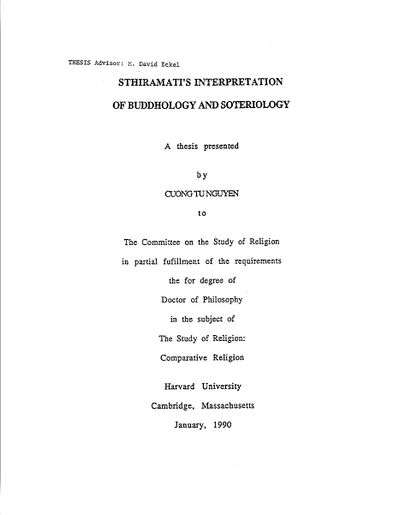Sthiramati's Interpretation of Buddhology and Soteriology
Abstract
This thesis gives an account of Yogācāra Buddhist thought as presented in the works of Sthiramati, a leading sixth-century thinker in the Yogācāra tradition, along with a translation of his commentary on the Chapter on Enlightenment of the Mahāyānasūtrālaṃkāra. The thesis introduces Sthiramati's life and times, and discusses the authorship and authenticity of works attributed to him.
Sthiramati's viewpoint is placed in the overall context of Yogācāra ontology. The thesis elucidates the fundamental categories of Yogācāra ontology, giving an analysis of the three identities (trisvabhāva) and their interrelationships, the connection between the three identities and the principle of representation-only (vijñaptimātra), and an account of basis-transformation (āśrayaparāvṛtti). This provides a philosophical foundation for interpreting the Yogācāra concept of Buddhahood, bringing out the intrinsic link between ontological realization and soteriological attainment in the Yogācāra system.
The thesis traces the Yogācāra account of Buddhahood in both its essence and its manifestation: Buddhahood is shown as both the absolute ground of being and as the locus for innumerable pure qualities and forms of mastery through which enlightenment is communicated to ordinary sentient beings. In this connection, the thesis presents the Yogācāra analysis of the Three Bodies of Buddha (Dharmakāya, the Truth-Body; Sambhogakāya, the Enjoyment-Body; Nirmāṇakāya, the Emanation-Body), which encompass both the essential being and the manifest functioning of Buddha. The three Budda-bodies are correlated with the four liberative wisdoms (jñāna) of the Buddha (the Mirror-like Wisdom, the Equality Wisdom, the Analytical Wisdom, and the All-Accomplishing Wisdom). The thesis recounts the classic Yogācāra discussion of the attributes of Buddhahood in terms of unity and multiplicity, and the nature and scope of Buddha's salvific activities.
The aims of the thesis are (1) to present Yogācāra Buddhology in its own terms; (2) to clarify the conceptual structure of Yogācāra Buddhology and the relationship in Yogācāra thought between Buddha and the phenomenal world, and between Buddha and the minds of sentient beings; and (3) to facilitate cross-cultural comparisons between Buddha and concepts of the Absolute in other religious traditions by providing a reliable presentation of the ontological, epistemological, and soteriological aspects of Yogācāra Buddhology.
| Citation | Nguyen, Cuong Tu. "Sthiramati's Interpretation of Buddhology and Soteriology." PhD diss., Harvard University, 1990. |
|---|---|

